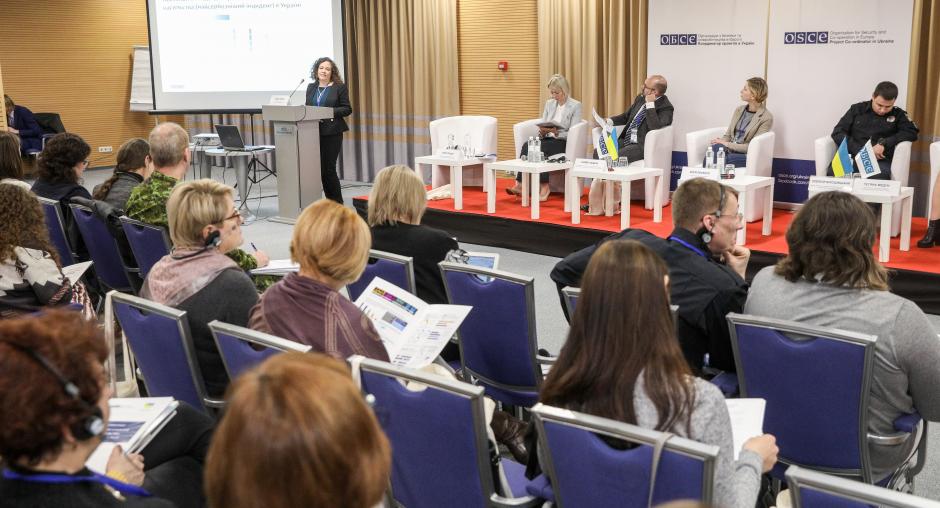OSCE presents results of the Survey on the Well-being and Safety of Women in Ukraine during 16 Days of Activism against Gender-based Violence

KYIV, 27 November 2019 – On 25 November the OSCE launched an awareness-raising campaign entitled “End the Silence” that is taking place during the 16 Days of Activism against Gender-Based Violence. Today, as part of the campaign, the Gender Section of the OSCE Secretariat and the OSCE Project Co-ordinator in Ukraine organized the conference “Gender Based Violence: From Data to Action” where the results of the 2018 OSCE-led Survey on the Well-being and Safety of Women in Ukraine were presented.
More than 15,000 women were interviewed in seven OSCE participating States: Albania, Bosnia and Herzegovina, Montenegro, North Macedonia, Serbia, Moldova and Ukraine. The research was also conducted in Kosovo. The aim of the campaign is to raise awareness about gender-based violence, in particular the issue of violence against women and girls. It can be followed on the OSCE’s Twitter https://twitter.com/OSCE and Facebook https://www.facebook.com/osce.org/ and https://www.facebook.com/OSCE.Ukraine.Project accounts as well as on the OSCE's Instagram https://www.instagram.com/osceorg. In December, the OSCE will deliver posters to police stations across the country to raise awareness of violence against women and the role of police in combating it.
In Ukraine, 2,048 women were interviewed for the survey. According to the survey, two thirds (67%) of women in Ukraine have experienced psychological, physical or sexual violence since the age of 15. It showed that violence by a partner is a major factor, with nearly three in ten women (28%) saying that they have experienced physical and/or sexual violence at their partner’s hands. Another key finding was that women whose partners have fought in a conflict are more likely to experience violence by their partner.
“We all can do something to prevent and combat violence against women and girls. In order to make sure that it doesn’t remain a private matter we must all speak up when we see it. We must also encourage men, and in particular young men, to talk about it among their friends and peers starting at school and all the way through further education. In order for women to live without violence, we must support and, more importantly, empower them,” said Serani Siegel, Project Manager in the Gender Section of the OSCE Secretariat.
“To form effective state policy to respond to gender-based violence it’s very Important not only to draw on statistical data, gathered by law enforcers and social services, national hotlines, but also to take into account research data that helps to analyze in-depth reasons of this problem, and trends of its development,” said Kateryna Levchenko, Government Commissioner on Gender Policy
Violence against women is closely related to lack of gender equality, which is itself based on harmful attitudes and stereotypes. In Ukraine, 41% of women think that if a man mistreats his wife, others outside the family should not intervene. Furthermore, women are often not well informed about what to do if they experience violence. Only 17% considered themselves well informed on this issue, while almost half (48%) felt badly informed or didn’t know what to do at all (17%).
“While we work with law enforcement to help them better respond to incidents of violence, awareness-raising efforts are also a priority. Addressing stereotypes, informing people of how victims of violence can get help is the way to promote a culture of zero-tolerance to violence” said Lilia Grudko, Head of the Human Security Programme of the OSCE Project Co-ordinator In Ukraine.
The Conference provided an opportunity to present recent OSCE awareness-raising efforts, including an educational project called House of (In)Security, launched this year in co-operation with the online learning platform EdEra. At the Conference, participants from international initiatives and projects, national stakeholders from Ukraine, experts and practitioners joined discussions on the efforts to further work on combating violence against women.
More information about the OSCE-led survey and the results for Ukraine can be found at: https://www.osce.org/VAWsurvey/publications. The survey was produced as part of a project funded by the European Union and supported by the UN Population Fund, UN Women and UNICEF, as well as by the governments of Austria, Finland, Germany, Italy, Liechtenstein, the Netherlands, Norway, the United States of America and Sweden.
